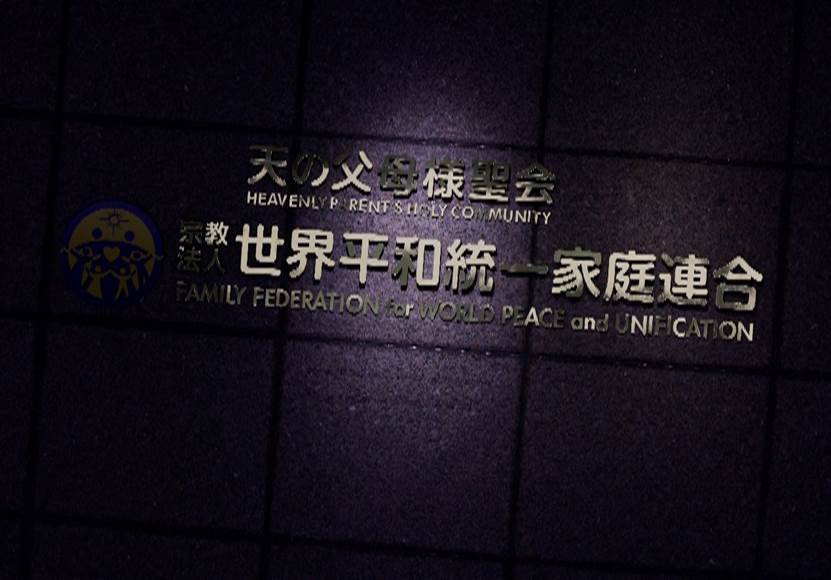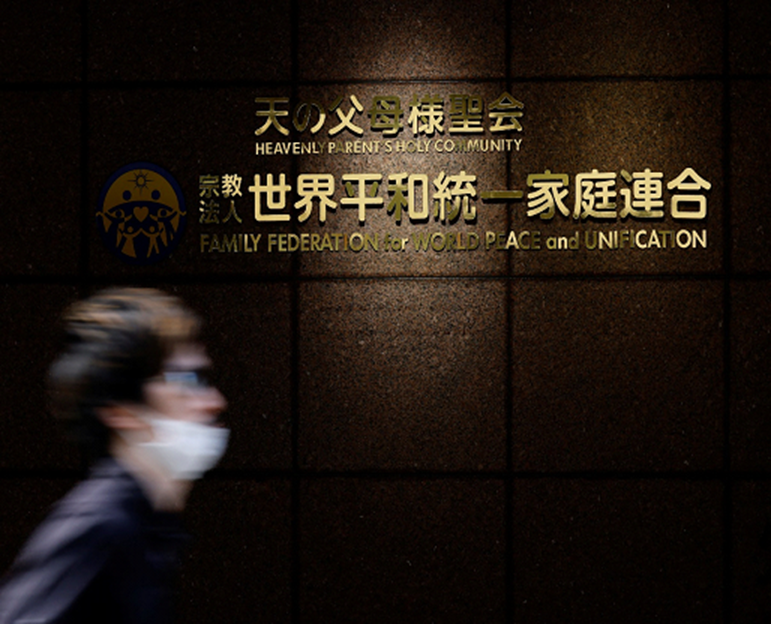
A no trespassing sign is placed outside the entrance of the Family Federation for World Peace and Unification, more commonly known as the Unification Church is seen at its Tokyo headquarters in Tokyo, Japan August 29, 2022. REUTERS/Kim Kyung-Hoon

A general view of Tokyo headquarters of the Family Federation for World Peace and Unification, more commonly known as the Unification Church, in Tokyo, Japan August 29, 2022. REUTERS/Kim Kyung-Hoon

The sign of the Family Federation for World Peace and Unification, more commonly known as the Unification Church, is pictured at its Tokyo headquarters in Tokyo, Japan August 29, 2022. REUTERS/Kim Kyung-Hoon

A person walks past the sign of Family Federation for World Peace and Unification, more commonly known as the Unification Church, at its Tokyo headquarters in Tokyo, Japan August 29, 2022. REUTERS/Kim Kyung-Hoon
TOKYO, Sept 8 (Reuters) - When Sun Myung Moon, the Korean founder of the Unification Church, needed money for its extensive spiritual and business ventures he would look to Japan, according to some former members.
"Senior officials would tell us he needed hundreds of millions of dollars and that Japan had to pay," said Masaki Nakamasa, a Kanazawa University professor who was a member of the church for 11 and a half years until 1992.
Moon, a self-proclaimed Messiah, died in 2012. His church's doctrine still urges its tens of thousands of Japanese members to make donations to atone for atrocities perpetrated during their country's 1910-1945 occupation of Korea.
According to church dogma, Japan is an Eve nation that, by consorting with the devil, betrayed Korea, portrayed as Adam.
Kwak Chung-hwan, who was Moon's deputy until the late 2000s, said the Unification Church had treated its followers in Japan like "an economic army" to raise donations and he said the organization should apologise for the excesses of its leadership in the country.
In a statement, the church dismissed Kwak's comment, saying he had discredited the organization and its followers.
While dozens of ex-members in Japan have sued the church since the 1980s over its fund raising, many former followers have hesitated until now to discuss their experiences publicly due to social stigma and fear of repercussions from their families.
The assassination of former Prime Minister Shinzo Abe in July, however, has opened a national debate in Japan over the Unification Church and has shone a spotlight on its close ties with the ruling Liberal Democratic Party (LDP).
The suspect in the killing, 41-year-old Tetsuya Yamagami, accused the church of impoverishing his family, according to police. In social media posts before the killing, he blamed Abe for supporting the religious group.
Starting with Abe's grandfather – ex-Prime Minister Nobusuke Kishi – the church openly cultivated relations with LDP leaders, based on their shared opposition to communism. Abe, like many other LDP lawmakers, spoke at church-related events. And his government removed the church from a list of organisations monitored by the Public Security Intelligence Agency.
Since Abe's killing, Japanese media have detailed ties between the church and dozens of LDP lawmakers. The party has acknowledged many individual lawmakers have ties to the church but it said there was no organisational link to the LDP itself.
Using information available on legislators’ websites and sources including videos posted online by the church, Reuters identified at least 65 LDP lawmakers - including Abe and 23 from his right-wing faction – who attended church events, sent congratulatory messages, paid membership fees, accepted political donations from its affiliates, or received election help.
LDP secretary-general Toshimitsu Motegi said on Thursday a party survey found 179 of its 379 lawmakers had had interactions with the church or its affiliates but that many of them did not understand the link between these exchanges and the church.
Motegi told reporters the LDP would "make sure nobody has connections with the Unification Church.".
Reuters spoke with seven former Unification Church followers who described how their families were burdened with heavy donations. Five of them said church officials instructed them to vote for LDP candidates at elections.
"Our lives were worth less than our votes," said one former church member, who said she was in hiding from her churchgoing mother and who posts online under the alias Keiko Kaburagi. She said that she did not condone Yamagami's actions but could "understand how he felt" toward the LDP.
The blogger, like four other former church members interviewed by Reuters, asked not to be identified to avoid possible harassment.
The Unification Church says it no longer accepts donations that cause financial hardship and has curtailed excessive "spiritual sales" of church goods after convictions for the practice a decade ago prompted its then-leader in Japan to resign.
The church says its political arm, the Universal Peace Federation (UPF), has courted lawmakers and most of them are from the LDP because of its ideological proximity, although it has no direct affiliation to the party.
POLITICAL CRISIS
Prime Minister Fumio Kishida’s emphatic win in July’s upper house elections – days after Abe’s shooting - was supposed to tighten his grip on the LDP, still dominated by the ex-premier’s supporters.
Instead, revelations over LDP links to the church and his decision to grant Abe, Japan’s longest-serving postwar leader, a rare state funeral have triggered a crisis. An opinion poll published on Monday by Japan’s biggest daily, the Yomiuri, showed that more than half of respondents opposed the funeral honours.
Five of the former followers interviewed by Reuters said the church directed its members to vote for LDP lawmakers who opposed LGBT rights and promoted traditional family values in line with church doctrine.
"Church leaders tell members at gatherings or through online messengers to vote for LDP candidates," said one second-generation member. The 20-something office worker asked not to be identified because their parents - who were married at a mass church ceremony - remain senior members.
The church says that it is does not give political guidance to members, which is done instead by the UPF.
Three current members interviewed by Reuters at church headquarters in Tokyo said that they were encouraged to vote in the upper house election for an LDP candidate, Yoshiyuki Inoue, a former political affairs secretary to Abe. Two of them said they did so.
Contacted by Reuters, Inoue's office acknowledged that Unification Church members had supported him but denied the LDP had worked on his behalf to get that help.
Because of the proportional representation system used in upper house elections – whereby voters can cast their ballot for a candidate anywhere in Japan – targeted church votes can make a difference in tight races.
Kishida attempted to draw a line under the scandal with a cabinet reshuffle on Aug. 10 that purged some senior figures with links to the church, including former trade and industry minister Koichi Hagiuda, a member of Abe’s faction.
At a news conference the same day, Tomihiro Tanaka, the head of the Unification Church in Japan, said a push by Kishida to sever ties with the church would be unfortunate.
Despite Kishida's effort to turn the page, a poll by the left-leaning Mainichi Shimbun daily on Aug. 22 showed that support for the government had fallen by 16 points from a month earlier to 36%. read more
In a news conference on Aug. 31, the prime minister went further, apologising for the LDP's ties to the church and promising to tackle them. read more
Yet Unification Church-connected lawmakers remain in Kishida’s administration, some in his cabinet and dozens more as junior ministers. Any attempt by the prime minister at a deeper purge would risk upsetting a delicate political balance within the fractious LDP, political analysts say.
"He doesn't really want any more dirt to be revealed," said Koichi Nakano, a political science professor at Sophia University in Tokyo. Kishida "is trying to sort of lead people to think that what was in the past is in the past. The problem is it's in the present."
ALWAYS WORKING, STILL POOR
Hiroshi Yamaguchi, a member of the National Network of Lawyers Against Spiritual Sales, which pursues compensation cases against the church, estimates that the church still raises around 10 billion yen ($70 million) a year in Japan, although that is down from 50 billion yen a year during the 1980s economic boom.
The church, which says Japan is home to one of its largest memberships, declined to say how much money it collects there.
Officially known as the Family Federation for World Peace and Unification, the church retains significant investments in media, schools, ginseng production, real estate and fishing operations. It is led by Moon’s widow, Hak Ja Han.
Four former members who spoke to Reuters described being asked to sell ginseng and other products door to door. Five said their families were coaxed into making donations they could ill-afford.
"We were poor even though my father was always working," said a social worker, 37, who left the church as a university student.
Their apartment in northern Japan had a kitchen, a bedroom she shared with her younger brother, and a room her parents used for sleeping and to display pictures, urns and other church artefacts they received as tokens for donations.
Now in Tokyo with her husband, she said she has minimal contact with her parents, who under church teachings she has condemned to hell.
"People don't realise there are second-generation people like me everywhere,” she said. "We are just hidden."
Her Twitter group with around 200 second-generation members has grown by around 50 people since Abe's death, she said. Its anonymity means former members can avoid the social stigma of being a follower, even a lapsed one.
Although the church says it has around 600,000 members in Japan, a spokesman said only around 100,000 are active and many second-generation members have drifted away from it.
One who spoke out publicly is Eri Kayoda, 28, who appeared on television after hearing that Yamagami's mother had given the Unification Church $730,000.
"My family was on the verge of collapsing because of donations," she told Reuters.
The church’s leader in Japan, Tanaka, said after Abe’s killing that it had returned half of the donation made by Yamagami's mother. The church has also said legal complaints have declined since it published guidelines in 2009 on donations in Japan.
TARGETED
Some former members expressed anger that Japanese believers were targeted by the Unification Church for heavier donations. Fees published by the church in 2011 on a training website showed Japanese followers were charged five times more than South Koreans in tithes to free their ancestors from hell.
"We paid more because Japan has a bigger economy," said Tsunefumi Harada, one of the three current followers who spoke to Reuters, defending the practice.
The church has become a target for nationalist sentiment. Its spokesperson played a video on his phone of right-wing vans decked with flags and nationalist symbols that turn up outside its Tokyo headquarters to blare denunciations from the loudspeakers on top.
Reuters could not independently verify the video.
The blogger, who uses the alias Kubagi, discovered the different pay scale when she married for a second time at one of the church’s mass ceremonies - a rare occurrence in a religion that forbids divorce but for which she received an exception because her first husband beat her, she said.
Her first marriage at 21 cost $10,000; the Korean rate she got for the second six years later was a tenth of that, she said.
Now in her late 40s, she is still angry. She divorced and returned to Japan from South Korea in 2013 after Moon died.
Back in Tokyo with her two daughters, she doesn't expect to see her mother again unless she leaves the church. Between them, she reckons they gave the church about $150,000, including $5,000 for a plum blossom painting she has kept, even though it is worthless.
"It's not the money I want back. I want the time the church took from me."
Original Website: https://www.reuters.com/world/asia-pacific/unification-church-ex-members-japan-rail-politicians-who-embraced-it-2022-09-07/





